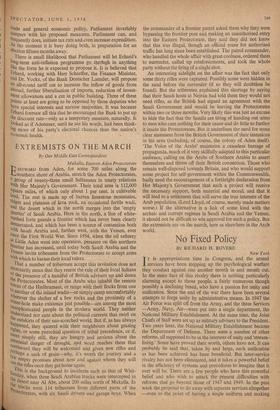EXTREMISTS ON THE MARCH
By Our Middle East Correspondent Mukalla, Eastern Aden Protectorate EAST WARD from Aden, for some 700 miles along the southern shore of Arabia, stretch the Aden Protectorates, group of twenty-three small Sultanates in treaty relations With Her Majesty's Government. Their total area is 112,000 square miles, of which only about 1 per cent. is cultivable land. The rest is made up of barren limestone mountains, ridges and plateaus of lava rock, an occasional fertile wadi, and the desert which in the north merges into the `empty (Planer' of Saudi Arabia. Here in the north, a line of white- washed forts guards a frontier which has never been clearly demarcated, and which has been a source of contention both with Saudi Arabia and, farther west, with the Yemen. ever Since the First World War. Since 1954, when the oil refinery at Little Aden went into operation, pressure on this northern Yemen has increased, until today both Saudi Arabia and the IFmen invite tribesmen from the Protectorate to accept arms With which to harass their local rulers.
That a number of tribesmen accept this invitation does not necessarily mean that they resent the rule of their local Sultans the the presence of a handful of British advisers up and down 'e Protectorates. Most of the Arabs who inhabit the remote ,Owns of the Hadhramaut, or range with their flocks from one t0 another of the inland wadis—or simply camp uncomfortably Wherever the shelter of a few rocks and the proximity of a water-hole make existence just possible—are among the most understand people in the modern world. They neither 11 ,,11derstand nor care about the political currents that swirl on the outskirts of their sun-scorched world. But if, as has always happened , they quarrel with their neighbours about grazing rights, or some parochial question of tribal precedence, or if, ni. Ore simply still, they are hungry and anxious about the Perennial danger of drought, and word reaches them that n °rthward, they will be welcomed and given new rifles and perhaps a sack of grain—why, it's worth the journey and a Lew empty promises about how and against whom they will tic the rifles once they get home again. This is the background to incidents such as that of Whit- slindaY, when three Saudi Arabian trucks were intercepted in the desert near Al Abr, about 200 miles north of Mukalla. In e- trucks were 114 tribesmen from different parts of the 'electorates, with six Saudi drivers and garage boys. When the commander of a frontier patrol asked them why they were bypassing the frontier post and making an unauthorised entry into the Eastern Protectorate, they said they did not know that this was illegal, though an official route for authorised traffic has long since been established. The patrol commander. who handled the whole affair with great coolness, ordered them, to surrender, called up reinforcements, and took the whole party without the firing of a single shot.
An interesting sidelight on the affair was the fact that only some thirty rifles were captured. Possibly some were hidden in the sand before the surrender (if so they will doubtless be found). But the tribesmen explained this shortage by .saying that their Saudi hosts at Nejran had told them they would not need rifles, as the British had signed an agreement with the Saudi Government and would be leaving the Protectorates within two or three months. Very likely this was just an excuse to hide the fact that the Saudis are tiring of handing out arms to men who care nothing for their cause and do little to further it inside the Protectorates. But it underlines the need for some clear statement from the British Government of their intentions in his area (including, of course, the colony of Aden itself). 'The Voice of the Arabs' maintains a ceaseless barrage of propaganda, much of it very skilfully adapted to this particular audience, calling on the Arabs of Southern Arabia to assert themselves and throw off their British connection. Those who remain well-disposed towards Britain, and who would support some project for self-government within the Commonwealth, badly need the encouragement of a forthright declaration from Her Majesty's Government that such a project will receive the necessary support, both material and moral, and that it will lead to a settlement that will serve the true interests of the Arab population. (Lord Lloyd, of course, merely made matters worse.) If the alternative is a link of some kind with the archaic and corrupt regimes in Saudi Arabia and the Yemen, it should not be difficult to win approval for such a policy. But the extremists are on the march, here as elsewhere in the Arab world.


































 Previous page
Previous page